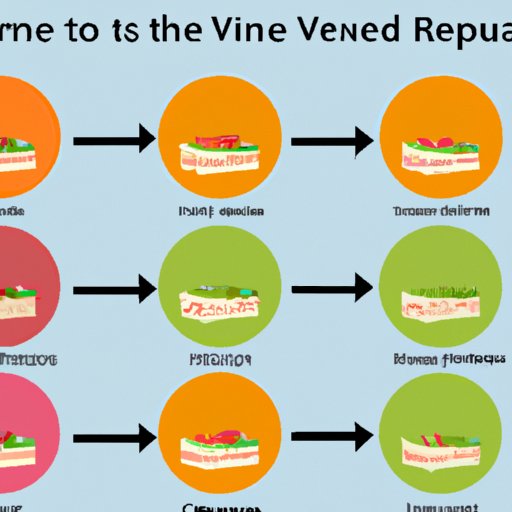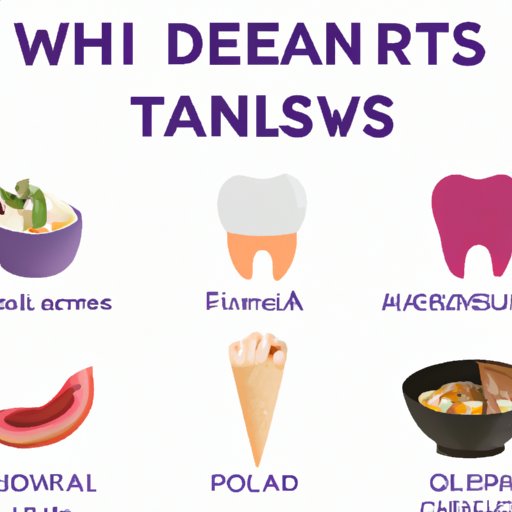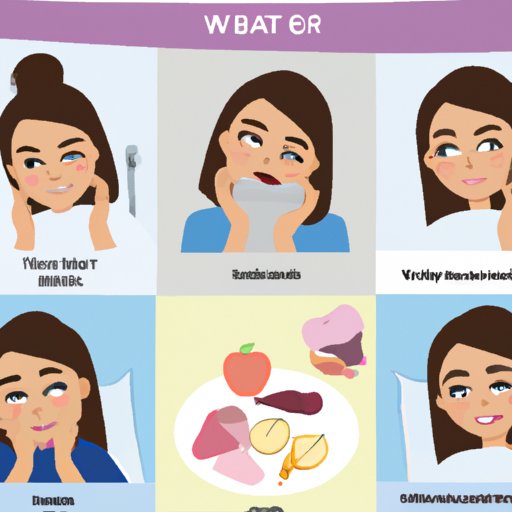Introduction
Wisdom teeth are the third molars that typically appear between the ages of 17 and 25. They are usually removed when they cause overcrowding or become impacted in the jaw. After wisdom teeth removal, it can take some time before you can return to your normal eating habits. This article will explore how long after wisdom teeth you can eat normally and provide guidance on eating right after the surgery.

Exploring the Timeline for Eating Normally After Wisdom Teeth Removal
The timeline for eating normally after wisdom teeth removal varies from person to person. Generally speaking, it takes about three to five days before you can return to your regular diet. During this time, it is important to focus on soft foods that are easy to chew and swallow.
How long after wisdom teeth removal can you eat normally?
Most people can start eating normally within three to five days after wisdom teeth removal, although it may take up to a week in some cases. If the extraction was more complex, it may take longer to recover and return to your normal eating habits. Your dentist will give you specific instructions regarding when to resume your regular diet.
Soft foods recommended in the first few days
In the first few days after wisdom teeth removal, it is important to stick to soft foods that will not irritate your gums or cause pain. Foods such as mashed potatoes, yogurt, applesauce, oatmeal, pudding, and scrambled eggs are all good choices. Avoid anything that requires a lot of chewing, such as steak, raw vegetables, and nuts.
Gradual transition back to solid foods
Once you have recovered enough to start eating normally, you should gradually transition back to solid foods. Start with softer foods such as cooked vegetables and lean proteins, and then slowly add in harder foods such as sandwiches and burgers. It is important to take small bites and chew thoroughly to prevent discomfort.
A Guide to Eating Right After Wisdom Teeth Removal
It can be difficult to know what to eat after wisdom teeth removal. However, there are certain nutritional needs that must be met in order to facilitate a speedy recovery. Here is a guide to eating right after wisdom teeth removal.
Nutritional needs after surgery
After wisdom teeth removal, it is important to make sure you are getting enough protein and vitamins to help your body heal. Good sources of protein include fish, chicken, eggs, and legumes. Vitamins such as vitamin C, zinc, and iron are also important for wound healing. You can get these vitamins from fruits, vegetables, and fortified foods.
Foods to consume after wisdom teeth removal
In addition to getting plenty of protein and vitamins, it is also important to focus on foods that are easy to chew and swallow. Soft foods such as mashed potatoes, oatmeal, yogurt, and soup are all good choices. It is also important to drink plenty of fluids to keep your mouth hydrated and help with the healing process.
Avoiding hard, crunchy and chewy foods
It is important to avoid hard, crunchy, and chewy foods after wisdom teeth removal. These types of foods can irritate the surgical site and delay healing. Examples of foods to avoid include popcorn, chips, nuts, and hard candy. Also, stay away from any food that requires a lot of chewing, such as steak and raw vegetables.

Foods to Avoid After Wisdom Teeth Removal
There are certain types of foods that should be avoided after wisdom teeth removal. Sugary drinks, sticky foods, and high-fat foods should all be avoided as they can increase inflammation and slow down the healing process.
Sugary drinks
Sugary drinks such as soda and juice can increase inflammation and delay healing. It is best to stick to water and other unsweetened beverages while recovering from wisdom teeth removal.
Sticky foods
Sticky foods such as caramel, taffy, and gum can be difficult to remove from the surgical site and can slow down the healing process. It is best to avoid these types of foods until you have fully recovered.
High-fat foods
High-fat foods such as fried foods, ice cream, and butter can increase inflammation and slow down healing. It is best to avoid these types of foods until you have fully recovered.
Tips for Eating Comfortably After Wisdom Teeth Removal
Eating after wisdom teeth removal can be uncomfortable and challenging. Here are some tips for eating comfortably:
Taking small bites
It is important to take small bites and chew thoroughly to prevent discomfort. Taking smaller bites will also help you to avoid overstuffing your mouth, which can be painful.
Chewing slowly and thoroughly
Chewing slowly and thoroughly can help to prevent pain and discomfort. It is also important to avoid any foods that require a lot of chewing, such as steak and raw vegetables.
Drinking plenty of fluids
It is important to drink plenty of fluids after wisdom teeth removal to keep your mouth hydrated and help with the healing process. Water is the best choice, but you can also opt for unsweetened tea and juices.

What to Expect From Eating Habits After Wisdom Teeth Removal
After wisdom teeth removal, it is important to be aware of potential changes in taste and swallowing difficulties. Here is what to expect from your eating habits after wisdom teeth removal.
Swelling and discomfort
You may experience swelling and discomfort in the area around the extraction site. This is normal and should subside within a few days. In the meantime, it is important to stick to soft foods and avoid anything that requires a lot of chewing.
Changes in taste
You may experience changes in taste after wisdom teeth removal. This is due to swelling and inflammation in the gums. These changes should subside within a few days, but in the meantime, try drinking cold beverages to help numb the area.
Difficulty swallowing
You may experience difficulty swallowing after wisdom teeth removal. This is due to swelling and inflammation in the throat and jaw. To reduce discomfort, try taking small bites and chewing slowly and thoroughly.
Conclusion
It can take several days before you can return to your normal eating habits after wisdom teeth removal. It is important to focus on soft foods that are easy to chew and swallow, as well as plenty of fluids. Avoid hard, crunchy, and chewy foods, as well as sugary drinks, sticky foods, and high-fat foods. Be aware of potential changes in taste and difficulty swallowing, and take small bites and chew slowly and thoroughly to reduce discomfort. With proper care and nutrition, you can make a full recovery from wisdom teeth removal.
For more information on wisdom teeth removal and eating habits, please consult your dentist or visit the American Dental Association website.
(Note: Is this article not meeting your expectations? Do you have knowledge or insights to share? Unlock new opportunities and expand your reach by joining our authors team. Click Registration to join us and share your expertise with our readers.)
